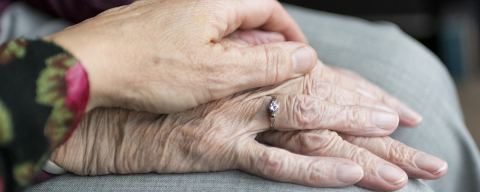Empowering Granite Staters to Live Full Lives
Chronic pain can disrupt an individual’s life. It can be experienced by anyone at any age and can be caused by a variety of health conditions, diseases or injuries. Chronic pain can greatly impact a person’s ability to interact positively with friends, family or co-workers. It can make daily tasks such as grocery shopping and cooking more challenging and negatively affect mental health.
UNH Extension is helping people combat those challenges by providing free, evidence-based programs for individuals in New Hampshire who experience daily chronic pain.
The national Self-Management Resource Center licenses organizations to provide the Chronic Pain Self-Management Program (CPSMP). There are two workshop series offered: Living Well with Chronic Pain and Take Charge of Your Health.
“Unfortunately, there is no one cure or method to help the 19% of Americans living day to day with chronic pain,” says Melissa Lee, youth and family resiliency field specialist for UNH Extension. “But increasing the availability of tools to help people stay meaningfully engaged in their lives can help reduce the impacts of chronic pain on job productivity, mental health challenges and substance misuse,” she says.
Rather than just getting prescribed medicine to manage pain, these self-management programs introduce holistic tools that help people take charge of their health. Each program series gives people the skills, tools and confidence needed to help them take control of their chronic condition(s) and live life to the fullest. The sessions deep dive into daily habits. Participants can connect with other people who are experiencing similar struggles.
New Hampshire residents have reported benefiting from these programs. Cheryl Harrison from Grafton County had a positive experience with the Living Well with Chronic Pain series. She has a condition called EhlersDanlos syndrome, which is hyper flexibility in the joints that has caused advanced arthritis throughout her whole body. “Ever since I found out I’ve had this condition I’ve been trying to find things to work with it because that is all I can do. There is no cure, and my body continues to deteriorate every day,” says Harrison. Before the program, she was severely depressed. But “ever since participating in this program, I am not as depressed about myself in my situation,” she says.
This series includes breakout sessions where participants can connect with one another. They are able to share their personal stories and experiences with chronic pain. Harrison was moved by hearing other people’s stories.
“I cried because I felt the same way that some other people felt. It was nice to connect with others and it benefited me, knowing that other people are surviving in this world with chronic pain,” she says.
Laurie McMicken from Strafford County also enjoyed this part of the program.
“I really liked the breakout sessions. I learned a lot from other participants, which was very helpful for my journey with my chronic arthritis and migraines,” she says.

McMicken now incorporates yoga and stretching into her daily routine, as well as relaxation techniques that were taught in the program. Janet Fotos from Hillsborough County learned a lot about self-responsibility. “I really liked the mindfulness aspect of it. I am a lot more in charge of my life since the program,” she says. The CPSMP has been rigorously evaluated in two randomized clinical trials funded by Health Canada and the Canadian Institutes of Health Research. The research studies found that, on average, people who have participated in the CPSMP have more vitality or energy, less pain, less dependence on others, improved mental health, are more involved in everyday activities and are more satisfied with their lives compared to those who have not taken the program.
A Rural Opioid Technical Assistance grant from the Substance Abuse and Mental Health Services Administration provided initial funding and additional funds are coming from the Administration on Aging. Extension offers these programs in partnership with the Southern New Hampshire Area Health Education Center and many other New Hampshire organizations that see value in increasing access to self-management education.
